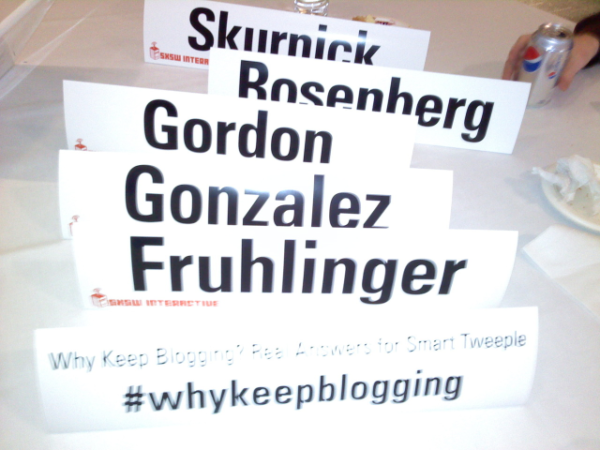Distinct from books, blogs are laboratories for passionate pursuits — where the profit motive can be put aside to accommodate expression and experimentation. It’s clear that virtually no one earns a decent living off blogging, so revel in the liberty of being beholden only to your interests. And when that interest flags and you begin to repeat yourself, as Guy LeCharles Gonzalez forcefully argued, quit and move on to the next thing.
“At SXSWi: Does blogging matter? How about Twitter?“, Peter Miller
I attended my first and only SXSWi in 2010, a couple of months after Digital Book World launched. Thanks to my own website and a solid presence on Twitter (RIP), I was arguably at the peak of my online visibility and was using my own platform to help establish DBW as a year-round community (RIP).
The sprawling conference was a great overall experience, which I will always fondly remember. I even still have the table tent with my name from the blogging panel I had the unexpected opportunity to participate on, thanks to an invitation from Emily Gordon, a corporate colleague at the time. The panel included veteran bloggers Josh Fruhlinger, Lizzie Skurnick, and Scott Rosenberg, moderated by Gordon, a notable blogger herself. I was a bit of an outlier in that mix, with a similarly long history of blogging, but definitely the lowest profile of the group.
As I wrote back then, “The point I made ‘forcefully’ that Miller was referring to was my belief the best blogs are driven by passion, not obligation, and that you can tell when someone is just feeding the machine to maintain their traffic, a la Seth Godin, for whom I often use the hashtag #bloggingtoohard.”
Fast-forward to 2025, blogs have been declared dead multiple times, “replaced” by Twitter and newsletters that are really just blogs with email and paywall functionality baked in. And yet, here I still am, blogging consistently (but not too hard) for the past few years. And I’m not alone.
But why? If you’ve known me for a while, you know a Cluetrain quote is coming!
Nascent Web publishing efforts have their genesis in a burning need to say something, but their ultimate success comes from people wanting to listen, needing to hear each other’s voices, and answering in kind.
“Talk Is Cheap”, The Cluetrain Manifesto, Rick Levine
Between Blogger, LiveJournal, WordPress, Tumblr, and a slew of short-lived alternatives like Vox, Posterous, and even Google+, I’ve been blogging since January 2003, shortly after returning to NYC after a disastrous year of living in Virginia. The first few years were primarily personal posts and there were no comments, never mind analytics or social media as we know them today. Discovery mostly happened through email and online forums like Yahoo! Groups (RIP), and “engagement” was mostly via links to/from posts commenting on and linking to other posts.
I was mostly out of the IRL poetry scene (RIP) by the time I started blogging, so my first real entry into a primarily online community was when I got back into comics and started blogging about them — first here, then on a separate blog, which was eventually imported back here after my passion for comics faded.
For the next few years, paralleling the rise of social media as we currently know it (RIP), I was blogging regularly about marketing and publishing; sometimes thinly veiled rants about things happening at the day job, but mostly commenting on the shenanigans of wannabe gurus making ridiculous claims about blogs, social media, and the future of media. That activity led to me “attending” my first Tools of Change conference in 2009 (RIP), via hashtag on Twitter, and encountering a number of people who would eventually become IRL colleagues and friends over the next few years. DBW was conceived at that conference, and my work directly and indirectly related to it over the next year ultimately led to my appearance at the aforementioned SXSWi in 2010.
Unfortunately, the combination of DBW’s rise and Twitter’s ease eventually led to my own blog fading into the background as I put my energy elsewhere, and several years passed before I found my way back here, ironically because of Substack.
Dammit, Jim; It’s a Blog!

Email has always been a primary channel for me at every marketing job I’ve had, and back in the late 90s, it played a big role in my building a little bit louder into a legitimate alternative to the Nuyorican Poets Café’s poetry slams, which was still capturing (but barely using) people’s physical mailing addresses for marketing. Watching Substack’s rise was perplexing to me because it was always obvious that it was effectively just a blogging platform with email baked into its DNA rather than bolted on (hi!), which made paywalled content feel different from running into it on a traditional blog or website.
When Twitter acquired Revue, a fledgling Substack competitor, I decided to test it out, launching “As in Guillotine” as a newsletter on February 11, 2021. Rather than repeating past mistakes by launching yet another hub, I simultaneously posted every issue here, too, naming them “Five Things” to not be redundant with the site’s name. That approach came in handy when I eventually moved to Substack and experimented with LinkedIn, before finally just making my own website its primary home — as it always should have been.
The “newsletter” has always just been an old school linkblog, evolving a bit over time in length and tone, but the core pitch hasn’t changed: “Five things of interest, every other Thursday. That’s it! That’s the description.”
It’s real purpose, though, was to get me reading and writing regularly again, after too many years of doomscrolling and tweeting, and almost a year of quarantine from the beginning of the pandemic. And it worked!
That anyone else finds it interesting enough to subscribe to, click through, read, and/or comment on is a welcome bonus, but I’d probably keep doing it without any external validation. For context, between email, WordPress, social media, and the limited information I have about my RSS feed, there’s probably fewer than 500 people who even know this site exists anymore, and if even 25% of them engage in some way every month, I’d be surprised. It’s a long way off from my “influencer” peak of 2008-2010, but I lost interest in playing the traffic and reach game many years ago.
After four years of almost consistently hitting a bi-weekly schedule with my pretend newsletter, I’ve also been writing separate posts like this one whenever inspiration hits on a more frequent basis, too. Prior to 2020, this would have just been a few random tweets, or simply not written down at all.
Now that we’re in the middle of a major social reboot, I’m glad I made the shift back to blogging when I did. I’ve also been excited to rebuild my digital feed around others who have continued to, are returning to, or are starting to blog on a regular basis. I even relaunched an old-fashioned blogroll with my current favorites! Some of them are technically newsletters, but don’t let the delivery format fool you; they’re really just blogs, too.
If you’ve found yourself exhausted by social media and have no interest in using a newsletter to build a “platform” but still have thoughts to share about whatever you’re currently passionate about, this might be the best time to (re)start a blog! Don’t overthink it like I did for several fallow years, either. Length doesn’t matter; topics don’t matter; even frequency doesn’t matter.
Start with one post about whatever’s currently engaging your attention, share it directly with friends and colleagues so they know you have a blog, and go from there. And don’t forget the best part of blogging is discovering and engaging with other bloggers.
Before they became walled gardens, social networks were great places for discovery, and although posts with links don’t get the visibility they used to on the bigger platforms, you shouldn’t be blogging or socializing for scale anyway. Defy Big Social and share those links to your own posts, and to posts you’ve enjoyed. Blogs only die when they’re abandoned by their owners.
Why keep blogging? Because the internet isn’t a walled garden, and it’s incomplete without your voice.
CREDIT: Photo by Patrick Fore on Unsplash.
Do you like email?
Sign up here to get my bi-weekly "newsletter" and/or receive every new blog post delivered right to your inbox. (Burner emails are fine. I get it!)


Why keep blogging? Because the internet isn’t a walled garden, and it’s incomplete without your voice.
Yes.
Thanks for this. You’ve nicely distilled what I’ve been going round and round about when I think about trying to re-engage with my own blogging.
And now I’ve discovered YOUR blog, enjoyed the first post I read (AI-Generated Poetry Responses), and now we’re connected. The internet still works!